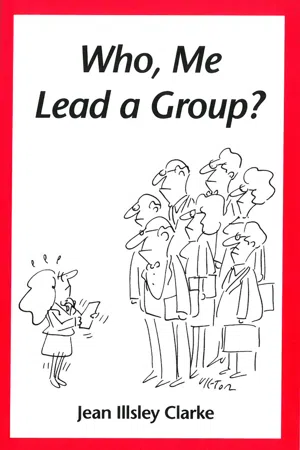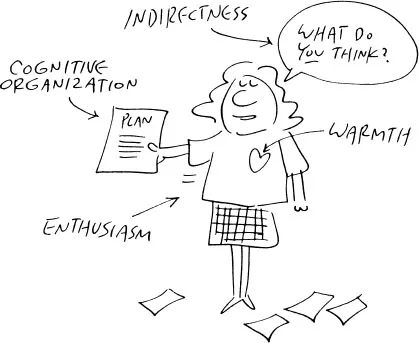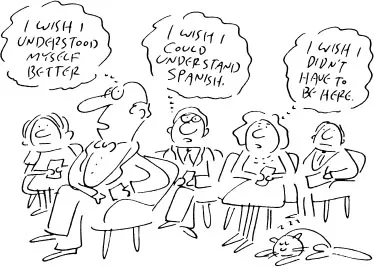
- 128 pages
- English
- ePUB (mobile friendly)
- Available on iOS & Android
Who, Me Lead a Group?
About this book
An indispensable guide for anyone nervous about leading a group, this practical book take readers step-by-step from planning to leading a meeting successfully. It discusses techniques that maximize group dynamics, qualities that make an effective leader, how readers can avoid sabotaging themselves before they speak, ground rules that help keep meetings on track, what to do when someone wants to use the meeting for their agenda, and how planning and preparation—while critical components—are only part of guaranteeing a successful meeting. This is an invaluable aid for anyone working with adults in community and religious organizations, training, counseling, business, schools, hospitals, social services, and a number of other fields.
Tools to learn more effectively

Saving Books

Keyword Search

Annotating Text

Listen to it instead
Information
QUESTION 1
What Are the Qualities of an Effective Leader of Adult Learning Groups?
- speak well of people.
- tend to like and trust rather than fear other people.
- establish warm relationships with people.
- let people discover things for themselves.
- are willing to refrain from telling everything they know, even when it would be “good for people.” Researcher Allan Tough found that learners preferred helpers who offered helpful resources rather than “answers.”3
- have clear behavioral objectives in mind.
- divide learning into orderly steps.
- have knowledge well-categorized so that they can offer appropriate data in response to questions.
- are clear about what they know and what they don’t know.
- are willing to say they do not know and do not pretend when they are in doubt.
- feel enthusiastic about people.
- are enthusiastic about the subject matter.





QUESTION 2
How Do Adults Learn, and How Can I Facilitate Adult Learning Groups?
What Motivates Adults to Learn?
 | “I wish I understood myself better.” |
 | “I just want to talk with some other people.” |
 | “I would like to learn to communicate better.” |
 | “I keep wondering where this group is going.” |
 | “Will this program help me understand what the threat of nuclear war means to me and my family?” |
 | “I’m upset because my spouse and I don’t agree on how to handle our teenager who got a DWI ticket. Are there any parents in this group who have solved that problem?” |
 | “I want to know how to speak Spanish before my trip to Mexico.” |
 | “Our committee has to come up with a plan for moving into the international market, but I only know the domestic market.” |

What Are the Steps in Adults’ Learning Process?
STEP 1: Where Adults Get Information
- to learn useful concepts and skills offered by the leader.
- to be offered visual helps such as books, charts, films.
- to benefit from the collective experience of other people in the group.
- to present material and then leave the decision about the materials and the life application up to the learners.
- to be sure that the visual material is available, clear, and readable.
- to structure ways in which the learners can tap the resources of other people in the group.
STEP 2: How Adults Organize Learning Material
Table of contents
- Cover
- Title Page
- Dedication
- Copyright
- Acknowledgments
- Contents
- How to Start
- Question 1: What Are the Qualities of an Effective Leader of Adult Learning Groups?
- Question 2: How Do Adults Learn, and How Can I Facilitate Adult Learning Groups?
- Question 3: How Do I Open the Meeting, and How Important is Opening?
- Question 4: How Can I Design a Meeting to Help Learning Happen?
- Question 5: How Do I End the Group, and How Important is Closure?
- Question 6: What is My Responsibility to the Group? What is My Contract?
- Question 7: What Will I Do If Problems Arise?
- Question 8: What Will I Do If Someone Wants to Use the Group for Personal Therapy?
- Question 9: What Can I Do to Prepare Myself?
- Question 10: How Do I Plan My Meeting?
- How to Continue
- Notes
- The Planning Wheel
- About the Author
- How Many Senses?
- Contract
- Evaluation Form
- Checklist for Leadership Skills
- Checklist for Meeting Structure
- Meeting Plan
Frequently asked questions
- Essential is ideal for learners and professionals who enjoy exploring a wide range of subjects. Access the Essential Library with 800,000+ trusted titles and best-sellers across business, personal growth, and the humanities. Includes unlimited reading time and Standard Read Aloud voice.
- Complete: Perfect for advanced learners and researchers needing full, unrestricted access. Unlock 1.4M+ books across hundreds of subjects, including academic and specialized titles. The Complete Plan also includes advanced features like Premium Read Aloud and Research Assistant.
Please note we cannot support devices running on iOS 13 and Android 7 or earlier. Learn more about using the app